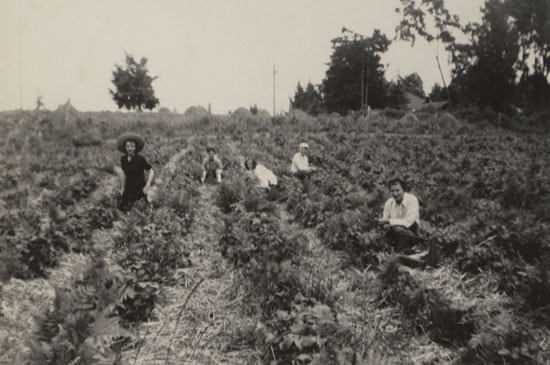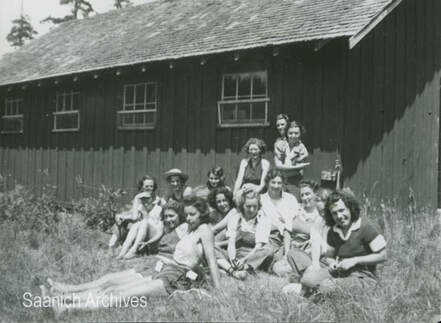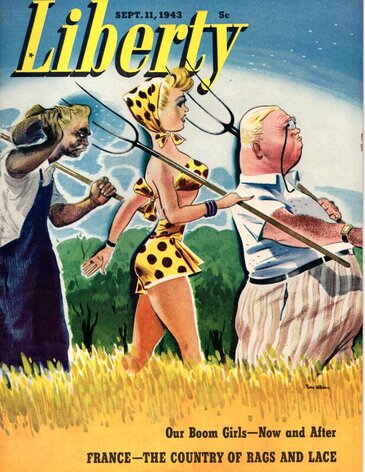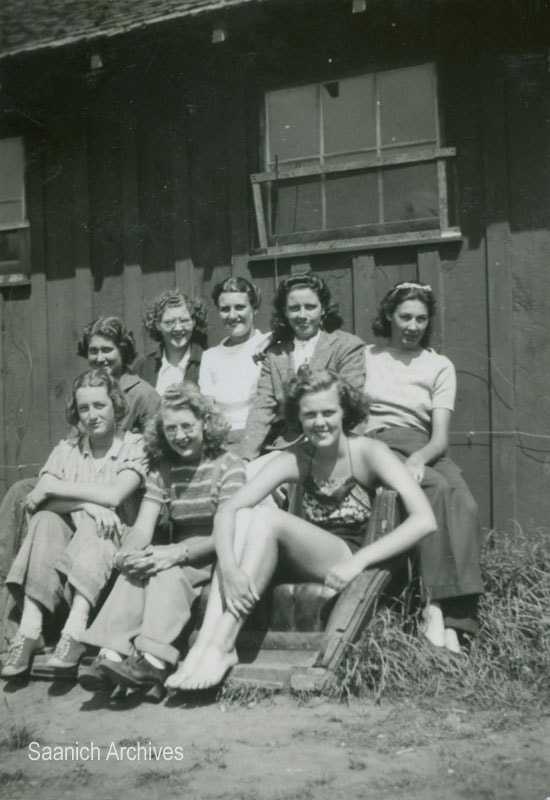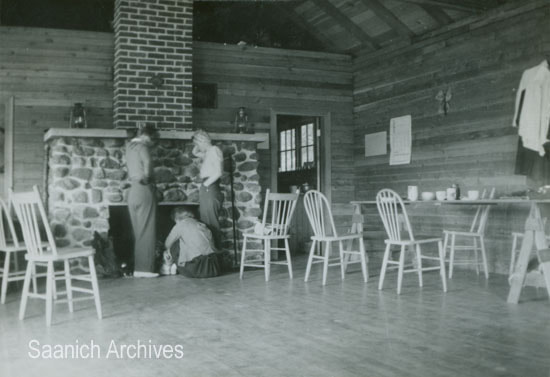
Badge.
In 1943, the Province of British Columbia established the "Volunteer Field Fighters" program (VFF). It operated as an umbrella term for anyone working on farms and in orchards as part of the war effort, including the B.C. Women's Land Army. However, the title Volunteer Field Fighters was scrapped after one year, and this badge, featuring a large V flanked by two smaller Fs, with B.C. at the top and Dominion Provincial written at the bottom, was only distributed to participants in 1943.
In 1943, the Province of British Columbia established the "Volunteer Field Fighters" program (VFF). It operated as an umbrella term for anyone working on farms and in orchards as part of the war effort, including the B.C. Women's Land Army. However, the title Volunteer Field Fighters was scrapped after one year, and this badge, featuring a large V flanked by two smaller Fs, with B.C. at the top and Dominion Provincial written at the bottom, was only distributed to participants in 1943.
B.C. Fruit Growers Need Help
In 1941, fruit growers and farmers in British Columbia began to realize that they needed new sources of agricultural labour. B.C. saw the highest rate of enlisted men in Canada, Japanese Canadians (who had been excellent fruit growers) were forcibly removed from their homes and interned due to fears after the bombing of Pearl Harbor, and women from rural areas were flocking to the shipyards and munitions factories along the coast.
In 1943, British Columbia’s department of Agriculture entered into an agreement with the federal government to create its own Provincial Women’s Land Army. Under a shared cost agreement, B.C. partnered with the Y.W.C.A. to create hostels for girls in the Fraser Valley Region and the Okanagan where they could stay and work for the summer months as a "Volunteer Field Fighter" (VFF). It was estimated that 1500 women would be needed for the 1943 harvest. However, despite attractive ad campaigns, by June 1, 1943, only 250 citizens from Vancouver and Victoria had volunteered.
Only three hostels were opened by the Y.W.C.A. in 1943: in Mission, Abbotsford, and Haney.
In 1944, the province of B.C. reached out for help from the Prairie Provinces, recruiting girls from Alberta and Saskatchewan. These girls also operated under a Women's Land Army, transported by train to central locations in B.C. and dispersed to farms in the area. The train fare to B.C. was free, and if the girl remained there for 10 weeks, she could obtain a 5 dollar return ticket. Hundreds of prairie women answered the call, living in cabins, picker shacks, and cleaned out chicken coops. These accommodations were typically provided by the farmer, but the girls brought their own cooking utensils, bedding, and camping gear.
Common jobs for these girl were:
Unlike in Ontario, B.C. did not put on "Miss Farmerette" pageants, print and distribute a newsletter, or provide the opportunity to purchase a uniform of any kind. Rural areas were much less developed, with few roads to connect towns or farms. It was a much more isolating existence for small pockets of women workers, and most were encouraged to create their own fun: swimming, knitting, and just spending time together in the evenings. There were few opportunities to attend dances, movies, or even church services.
The program continued until 1948, when the Dominion decided to dissolve the program and withdrew their funding. While the movement of prairie women into B.C. remained popular until the program ended, Y.W.C.A. hostels actually decreased in operation from 3 in 1943, to 2 in 1944. These two hostels were used again in 1945, but the Y.W.C.A. cancelled their operations in 1946.
In 1943, British Columbia’s department of Agriculture entered into an agreement with the federal government to create its own Provincial Women’s Land Army. Under a shared cost agreement, B.C. partnered with the Y.W.C.A. to create hostels for girls in the Fraser Valley Region and the Okanagan where they could stay and work for the summer months as a "Volunteer Field Fighter" (VFF). It was estimated that 1500 women would be needed for the 1943 harvest. However, despite attractive ad campaigns, by June 1, 1943, only 250 citizens from Vancouver and Victoria had volunteered.
Only three hostels were opened by the Y.W.C.A. in 1943: in Mission, Abbotsford, and Haney.
In 1944, the province of B.C. reached out for help from the Prairie Provinces, recruiting girls from Alberta and Saskatchewan. These girls also operated under a Women's Land Army, transported by train to central locations in B.C. and dispersed to farms in the area. The train fare to B.C. was free, and if the girl remained there for 10 weeks, she could obtain a 5 dollar return ticket. Hundreds of prairie women answered the call, living in cabins, picker shacks, and cleaned out chicken coops. These accommodations were typically provided by the farmer, but the girls brought their own cooking utensils, bedding, and camping gear.
Common jobs for these girl were:
- thinning, spraying, pruning, and picking in fruit orchards
- hoeing, weeding, planting, and picking fruits and vegetables
- working in the canneries, sorting, packing, and canning fruits and vegetables
- working in the box-making factories, putting together packing boxes for fruits and vegetables
Unlike in Ontario, B.C. did not put on "Miss Farmerette" pageants, print and distribute a newsletter, or provide the opportunity to purchase a uniform of any kind. Rural areas were much less developed, with few roads to connect towns or farms. It was a much more isolating existence for small pockets of women workers, and most were encouraged to create their own fun: swimming, knitting, and just spending time together in the evenings. There were few opportunities to attend dances, movies, or even church services.
The program continued until 1948, when the Dominion decided to dissolve the program and withdrew their funding. While the movement of prairie women into B.C. remained popular until the program ended, Y.W.C.A. hostels actually decreased in operation from 3 in 1943, to 2 in 1944. These two hostels were used again in 1945, but the Y.W.C.A. cancelled their operations in 1946.
|
|
Sources.
British Columbia Department of Agriculture Annual Reports for the Years 1942 to 1948.
B.C. Archives, Premiers’ Papers, Department of Agriculture, GR1222.
Lonie, Kelsey. "Vacation for Victory!: British Columbia’s Call for a Women’s Land Army during the Second World War and the Prairie Women Who Answered." Masters Thesis, University of Regina, 2023.
British Columbia Department of Agriculture Annual Reports for the Years 1942 to 1948.
B.C. Archives, Premiers’ Papers, Department of Agriculture, GR1222.
Lonie, Kelsey. "Vacation for Victory!: British Columbia’s Call for a Women’s Land Army during the Second World War and the Prairie Women Who Answered." Masters Thesis, University of Regina, 2023.
